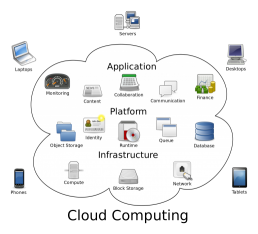Cloud technologies became the leading IT-direction in 2017 and those who have already applied them, effectively optimize the IT-structure of the enterprise. And those who are unfamiliar with it and did not transfer information to the cloud storage, are using hybrid options now.
Amazon Web Services and Microsoft Azure are the examples of the most successful and efficiently growing companies.
Who benefits from switching to cloud environment?
- IT companies engaged in software development and testing
- IT companies that use transition to cloud environment as a platform for using new applications
- IT companies that chose to transfer data to the cloud such as websites and digital projects
- IT companies that prefer the mobile version, because cloud solutions perfectly adapt to various devices, whether it's a tablet, smartphone, laptop etc.
- IT companies that transferred their component business process components to the cloud storage (legal information, sale applications, innovations, developments)
- IT companies that think several moves ahead and try to optimize their arrangements for transition to the cloud. For this reason they transfer the data centers in their entirety. They believe that the time for a technological upgrade of their platforms is yet to come
- IT-companies that bring themselves to anything in terms of switch to the cloud. The entire IT infrastructure is subject to transition
Who should and should not move into the cloud?
We break the myths about the cloud migration and try to understand who should use the cloud service, and who should consider other options:
- If your resource, whether it be an online store or a blog, or an enterprise site may not have a tendency to high growth or high traffic level, then the use of VPS is more effective. Cloud migration is not recommended.
- If your resource is experiencing a load on traffic or a seasonal increase in activity, then the cloud migration is necessary for you.
- Clouds can be used in combating temporary or maximum loads. In case of such loads, additional servers are connected. And in case of savings and when there is no need for such necessity, unnecessary resources are disabled. Switch to the cloud is recommended.
- The intended use of the cloud services is the ideal solution for start-up companies limited by a small start-up capital. It is not necesary to think about building a large-scale infrastructure, keeping it up-to-date, hiring qualified IT professionals and backing up data. Therefore, the cloud migration is recommended.
- Almost all companies come to the fact that they need to do something with the accumulated information. It must be managed. That is it must be protected, compressed as much as possible, copied as necessary and checked for relevance. The switch to the cloud is recommended.
- An effective business process excludes the presence of any malfunctions or force majeure situations. Therefore, to exclude the risk of large-scale collection it is recommended to use cloud services, because virtual servers are protected from such situations. Various spare options such as cold, warm and hot spare are at your disposal. It is recommended to use the cloud.
- One of the popular methods of using a virtual server is to create a platform for testing, researching and developing projects. It is state-of-the-art and safe. The switch to the cloud is recommended.
- Among the major advanced companies, there are those who found full cloud migration profitable, so as not to be distracted by the creation and support of infrastructure, but to do business instead.
Reasons why is in no hurry to switch to the clouds
- Doubts about the speed of data transfer
- Payments overseas
- English-speaking support
- Not understanding the basic idea
In fact, these problems in the context of the cloud migration are solved by the IT integrator. The cloud migration is a series of activities that require skills and experience, so as not to entail downtime of services in the work of an organization. Therefore, it is often the right decision to transfer such functions to the company’s IT integrator. We provide services such as: planning an optimal scheme of work (fully cloud or hybrid architecture), calculating the economic effect of moving to the cloud, developing a plan, implementing a transition to the cloud, supporting cloud solutions such as Azure, AWS, and other less popular ones.
What is a cloud?
Classic IT
The system administrator: is responsible for the operation of servers, applications, databases, IT security, deals with networks and data storage, as well as virtualization.
Infrastructure as a service IAAS
System administrator: deals with applications, databases, IT security
Provider: deals with servers, data storage, as well as virtualization.
Example: hosting

Platform as a Service PAAS
System administrator: deals with applications
Provider: responsible for the operation of servers, databases, networks, IT security, data storage, as well as virtualization.
Example: Windows Azure from Microsoft
Soft as a service SAAS
Provider: responsible for the operation of servers, applications, databases, networks, IT security, data storage, as well as virtualization.
Example: Office 365 Virtual Office
What’s the bottom line?
We saw that depending on the situation and specific circumstances, you can give preference to your own server and virtual in the cloud. Often, cloud servers are more expensive than physical servers, and they cannot solve all the problems, but they are always up to date and ready for work.
We can help you choose between them, offer ready-made options, according to your requirements, and provide different versions of the workflow and consult you if necessary.